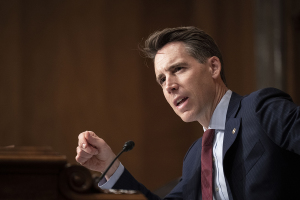Resurrected Game Rating Bill Challenges Entertainment Industry
NEW YORK – The Entertainment Software Rating Board (ESRB), which assigns ratings for the content and age-appropriateness of computer and video games, is seeking to hire full-time game raters in wake of renewed legislative pressure.
In a brief help-wanted posting this past week in the parenting-oriented site GamerDad.com, the ESRB stated that it is looking for full-time raters with "experience with children," "interest in and familiarity with video games," and “good communications skills (verbal, written).”
ESRB president Patricia Vance explained in a prepared statement that the switch from part-time to full-time raters came “after months of careful consideration” and is expected to take place in April 2007.
"Having full-time raters will allow for each one to have greater experience actually reviewing content and recommending ratings, given the increased amount of time each one would spend doing it,” Vance stated. “This would provide each rater with a greater sense of historical parity for ratings, not to mention helping them to be more attuned to pertinent content and how it should be considered from a ratings standpoint."
ESRB’s posting in GamerDad.com comes one week after Sen. Sam Brownback (R-Kan.) reintroduced The Truth in Video Game Rating Act, a bill that aims to put stronger regulations on the video game industry. First proposed last September, the bill hopes to reduce “deceptive” rating labels by requiring rating outfits to play all games “in their entirety” before announcing a rating. Currently, games are labeled only by submissions of “pertinent content” from the game makers, including the most extreme instances of sex, violence, language, drugs, and gambling.
The new proposal has been highly lauded by Christian and pro-family advocates who are worried about the content that children are exposed to.
“We are grateful that Senator Brownback recognizes the danger of marketing violent and sexually graphic video games to minors under inaccurate ratings,” said Tim Winter, president of the Parents Television Council (PTC), a non-profit that lobbies for family-friendly media, in a statement.
Uproar ensued after the release of the popular video game Grand Theft Auto: San Andreas in 2005. In it was a readily downloadable modification could unlock sexually explicit scenes.
The new bill would prohibit game developers from withholding any hidden content in their games.
“There is a clear conflict of interest that arises when a video game’s producers and distributors submit segments of their choice to the Entertainment Software Ratings Board for review,” stated Winter. “Clearly, the ratings based on these hand selected clips are often an inaccurate representation of the full playable content.”
Many from the entertainment industry are unhappy with the proposed bill, however. Games that have branching storylines are especially resistant.
"Sen. Brownback's bill not only attempts to address problems that don't exist, but his recommendations are unworkable and will not help consumers," Carolyn Rauch, a senior vice president at Entertainment Software Association (ESA), a lobby group for video games, replied in CNET News. "For instance, how does one play a game in its 'entirety' when a game has no defined end?"
In addition to the rating system itself, Brownback’s bill is also addressing the issue that ratings groups have conflicts of interests that sway their ratings.
The ESRB, the video game industry's primary self-regulatory body, has been singled out in the bill. Brownback, a presidential hopeful, noted it may be better to find a rating organization that does not have financial ties to the gaming industry.
“The PTC applauds Senator Brownback for adding language in the bill to commission a Government Accountability Office study to evaluate the current video game rating system, look into instating an independent rating system that is not controlled by financial stakeholders, and consider the application of a universal ratings system to television, moves and video games,” Winter commented.
The bill was first introduced last September by Fred Upton (R-Mich.) and Cliff Stearns (R-Fla.) and never progressed to a vote.
Christian Post Reporter Kevin Jackson in New York contributed to this report.



























